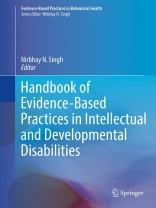This handbook presents a diverse range of effective treatment approaches for individuals with intellectual and developmental disabilities (IDD). Its triple focus on key concepts, treatment and training modalities, and evidence-based interventions for challenging behaviors of individuals with IDD provides a solid foundation for effective treatment strategies, theory-to-implementation issues, and the philosophical and moral aspects of care. Expert contributions advocate for changes in treating individuals with intellectual and developmental disabilities by emphasizing caregiver support as well as respecting and encouraging client autonomy, self-determination, and choice. With its quality-of-life approach, the handbook details practices that are person-centered and supportive as well as therapeutically sound.
Topics featured in the handbook include:
- Functional and preference assessments for clinical decision making.
- Treatment modalities from cognitive behavioral therapy and pharmacotherapy to mindfulness, telehealth, and assistive technologies.
- Self-determination and choice as well as community living skills.
- Quality-of-life issues for individuals with IDD.
- Early intensive behavior interventions for autism spectrum disorder.
- Skills training for parents of children with IDD as well as staff training in positive behavior support.
- Evidence-based interventions for a wide range of challenging behaviors and issues.
The
Handbook of Evidence-Based Practices in Intellectual and Developmental Disabilities is a must-have resource for researchers, clinicians, scientist-practitioners, and graduate students in clinical psychology, social work, behavior therapy, and rehabilitation.
Содержание
Chapter 1. Implementing Evidence-Based Practices Wisely.- PART 1: Foundations.- Chapter 2. Definition and Nature of Intellectual Disability.- Chapter 3. Evidence-Based Practices.- Chapter 4. Functional Assessment.- Chapter 5. Preference Assessments for Clinical Decision Making.- Chapter 6. Prevention of Severe Problem Behavior.- Chapter 7. Community Support Needs.- Chapter 8. Quality of Life.- Chapter 9. Functional Skills.- PART 2: Treatment and Training Modalities.- Chapter 10. Complementary and Alternative Therapies.- Chapter 11. Cognitive Behavioral Therapy.- Chapter 12. Mindfulness.- Chapter 13. Psychopharmacology.- Chapter 14. Assistive Technology.- Chapter 15. Positive Behavior Support.- Chapter 16. Staff Training in Positive Behavior Support.- Chapter 17. Parent Training.- Chapter 18. Social Skills.- Chapter 19. Early Intensive Behavioral Interventions.- Chapter 20. Active Support.- Chapter 21. Self-Determination and Choice.- Chapter 22. Telehealth.- Chapter 23. Skills Trainingfor Parents with Intellectual Disabilities.- PART 3: Evidence-Based Interventions.- Chapter 24. Self-Injury.- Chapter 25. Rumination.- Chapter 26. Pica.- Chapter 27. Aggressive Behavior.- Chapter 28. Stereotypy.- Chapter 29. Inappropriate Sexual Behavior and Sexual Offending.- Chapter 30. Sleep Disorders.- Chapter 31. Communication.- Chapter 32. Vocational Training.- Chapter 33. Leisure Skills.- Chapter 34. Community Living and Participation.- Chapter 35. Health and Wellness.- Chapter 36. Safety Skills.- Chapter 37. Toilet Training.- Chapter 38. Substance Use Disorders.
Об авторе
Nirbhay N. Singh, Ph.D., is Clinical Professor of Psychiatry at the Medical College of Georgia, Georgia Regents University, Augusta GA. He is also with ONE Research Institute in Raleigh NC. He was formerly a Professor of Psychiatry, Pediatrics, and Clinical Psychology at the Virginia Commonwealth University School of Medicine and Director of the Commonwealth Institute for Child and Family Studies, Richmond VA. His research interests include behavioral and psychopharmacological treatments of individuals with disabilities, assistive technology for supporting individuals with severe, profound, and multiple disabilities, and mindfulness. He is the Editor-in-Chief of two international journals, Journal of Child and Family Studies and Mindfulness, and Editor of the book series, Mindfulness in Behavioral Health.












